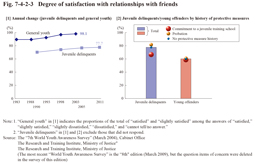3 Degree of satisfaction with relationships with friends
Fig. 7-4-2-3 shows the annual changes in degree of satisfaction with relationships with friends (proportion of the total of “satisfied” and “slightly satisfied”; hereinafter the same in this section) (of juvenile delinquents and general youth) of juvenile delinquents/young offenders by history of protective measures.
With juvenile delinquents the percentage of those that were satisfied with their relationships with friends was 77.7% and on a gradually rising trend, but lower by approximately 20 points than with general youth. Examining juvenile delinquents by their history of protective measures revealed that the percentage of those that were satisfied with their relationships with friends was 66.7% with those with a history of commitment to a juvenile training school, which was 11 points lower than that with all juvenile delinquents. With young offenders the percentage of those that were satisfied with their relationships with friends was 60.2%, which was even lower than with juvenile delinquents.
Examining the major reasons of those that were “dissatisfied” (total of “dissatisfied" and “slightly dissatisfied”; hereinafter the same in this section) with their relationships with friends revealed that many of them answered “unable to open our hearts to each other” (55.8% with juvenile delinquents and 59.4% with young offenders), “not worthwhile keeping company as it does not improve myself” (36.5% and 39.1% (id.)), and “have to keep company in spite of not liking them” (34.6% and 26.6% (id.)), thus indicating that many of them merely had superficial relationships with their friends without a sense of trust or a constructive relationship.
Fig. 7-4-2-3 Degree of satisfaction with relationships with friends
